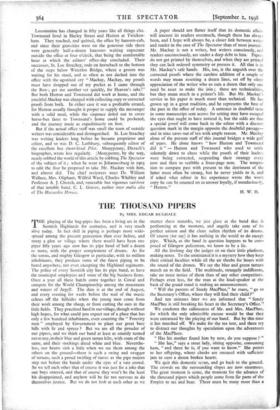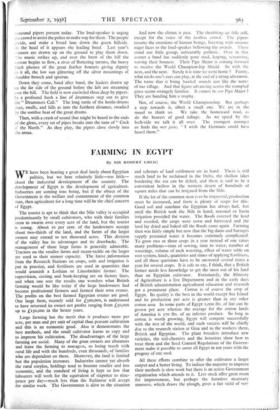THE TIIOUSAND PIPERS
By MRS. EDGAR DUGDALE
THEplaying of the bag-pipes has been a living art in the Scottish Highlands for centuries, and is very much alive today. In fact skill in piping is perhaps more wide- spread among the present generation than ever before, and many a glen or village where there would have been one piper fifty years ago now has its pipe band of half a dozen or more, with the proper complement of drums. As for the towns, and mighty Glasgow in particular, with its million inhabitants, they produce some of the finest piping to be heard anywhere, not even excepting the Highland regiments. The police of every Scottish city has its pipe band, as have the municipal employees and some of the big business firms. Once a year all these bands come together in Cowal and compete for the World Championship among the mountains and waters of Argyll. The date is at the end of August, and every evening for weeks before the wail of the music echoes off the hillsides when the young men come from their work among the sheep, or from cutting the oats in the little fields. They practised hard in our village, though without high hopes, for what could you expect out of a place that has only a few hundred inhabitants, even counting the " Forestry men " employed by Government to plant our great bare hills with fir and spruce ? But we are all the prouder of our pipers, and we think our band at least as smartly turned out as any, in their blue and green tartan kilts, with coats of the same, and their stockings diced white and blue. Neverthe- less, our hearts sink a little when we see them among the others on the ground—there is such a swing and swagger of tartans, such a proud twirling of staves as the pipe majors step out before the bands under the eyes of a vast crowd. So we tell each other that of course it was just for a joke that our boys entered, and that of course they won't be the least bit disappointed, and anyhow will be far too nervous to do themselves justice. But we do not look at each other as we mutter these remarks, we just glare at the band that is performing at the moment, and angrily take note of its perfect unison and the clean sullen rhythm of its drums. Of course (we say) it has nothing in the world to do except pipe. Which, as the band in question happens to be com- posed of Glasgow policemen, we know to be a lie.
All the livelong day the judges sit on their little platform, making notes. To the uninitiatedit is a mystery how they keep their critical faculties while all the air throbs for hours with the sound of the drones. We see the blue and green tartans march on to .the field. The multitude, strangely indifferent, take no more notice of them than of any other competitors. Perhaps even less, for the man at the loud-speaker at the back of the grand stand is making an announcement.
" Will the parents of Sandy MacPhee," he roars, " go to the Secretary's Office, where they will find their child?"
And ten minutes later we are informed that " Sandy MacPhee is still breaking his heart in the Secretary's Office.", We condemn the callousness of Mr. and Mrs. MacPhee, for which the only admissible excuse would be that they were entranced by the playing of our band. But by this time it has marched off We make for the tea tent, and there try to distract our thoughts by speculation upon the adventures of the MacPhees.
" Has his mother found him by now, do you suppose ?
" She has," says a stout lady, sitting opposite, consuming ham, " and there he is, if you want to know." She points to her offspring, whose cheeks are smeared with sufficient jam to cure a dozen broken hearts.
We quit this- domestic scene, and go back to the grOund. The crowds on the surrounding slopes are now enormous. The great moment is come, the Moment for the advance of the thousand pipers which people come from far parts of the Empire to see and hear. There must be many more than a thousand pipers present today. The loud-speaker is urging the crowd to assist the police to make way for them. The people divide, and make a broad lane down the green hillside. At the head of it appears the leading band. Last year's .% inners are drawn up on the ground to play them down. The music strikes up, and over the brow of the hill the torrent begins to flow, a river of fluttering tartans, the heavy black plumes of the great feather bonnets giving dignity to it all, the low sun glittering off the silver mountings of shoulder brooch and sporran.
Down they come, band after band, the leaders drawn up on the far side of the ground before the hat are streaming over the hill. The field is now encircled three deep by pipers. In a profound hush a line of drummers step out to give the " Drummers Call." The long rattle of the kettle-drums rises, swells, and falls as into the furthest distance, steadied by the sombre beat of the great drums.
Then, with a crash of sound that might be heard to the ends of the glens, every set of pipes breaks into the tune of " Cock o' the North." As they play, the pipers close slowly into the arena. And now the climax is past. The throbbing air falls still, except for the voice of the restless crowd. The pipers resume the emotions of human beings, listening with anxious eager faces to the loud-speaker bellowing the awards. There stand our little group, unbearably pathetic. Over in that corner a band has suddenly gone mad, leaping, screaming, waving their bonnets. Their Pipe Major is coming forward to receive the World Championship Shield. So with the next, and the next. Surely it is time we went home ? Funny, what tricks one's ears can play, at the end of a tiring afternoon. The name that is being bawled sounds just like the name of our village. And that figure advancing across the trampled grass seems strangely familiar. It cannot be our Pipe Major ? They are handing him a trophy.
Not, of course, the World Championship. But perhaps a step towards it, albeit a small one. We are in the mood to think so. We take the homeward road, as do the bearers of good tidings. As we speed by the loch-side we talk it all over. The youngest amongst us finds the ?not juste, " I wish the Germans could have heard them."







































 Previous page
Previous page